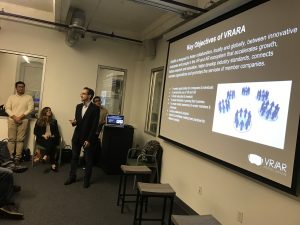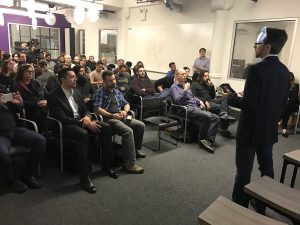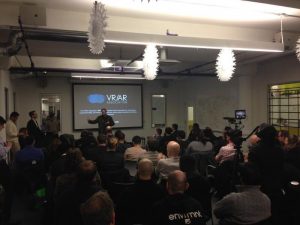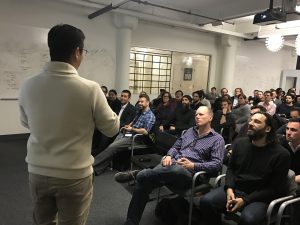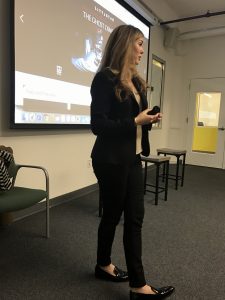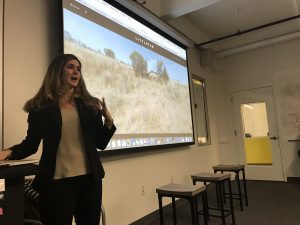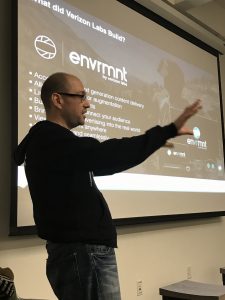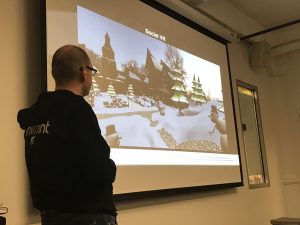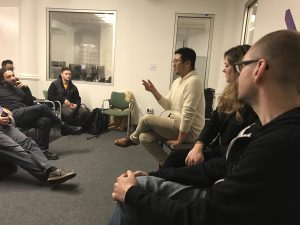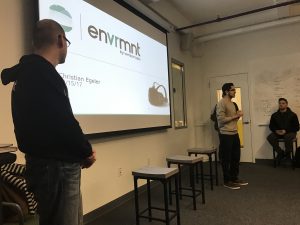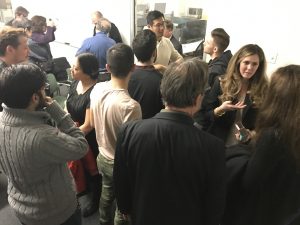The industry gathering that officially cemented Vancouver as one of the major centers of virtual reality and augmented reality (or, just use extended reality – or XR – as your umbrella designation), the VR/AR Global Summit, provided a view of the technology and creative sectors that are driving new avenues for audiences and investors on a global scale. Held at the gleaming Parq Vancouver hotel and casino, which just recently celebrated its first anniversary, the event was largely sponsored by Vancouver’s events chamber, and had the British Columbia economic development stamp of approval all over it. And, for those of us who have known Vancouver as a powerhouse in the visual effects and videogaming spaces for years, the increased emphasis on Vancouver as a hub for XR development of all kinds is both obvious and welcoming.
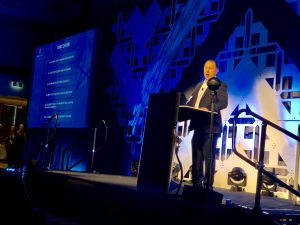
Nathan Pettyjohn welcomes the crowd at the VR/AR Global Summit in Vancouver, September 21, 2018
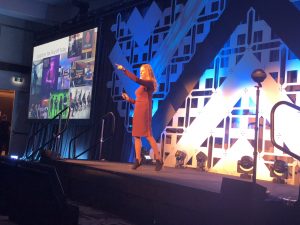
HP Entertainment’s Joanna Popper details HP’s work in the immersive space
While the VR/AR Global Summit, held on Friday, September 21stand Saturday, September 22nd, was as much a homecoming and meet-up for members of the three-year-old VR/AR Association, many of whom had never met in person (and, yes, Kris Kolo, the elusive, near-mythical executive director, was there for people to actually meet, and dispel rumors that he is merely a clever avatar), the event summoned an even greater level of introduction to innovation that is happening rapidly in the immersive space, even for those whose revenue depends on some form of XR development.
The brainchild of Anne Marie Ens, executive producer of the event, the VR/AR Global Summit brought leaders from Hollywood, New York, Washington, D.C., the Bay Area, Taiwan, Ukraine, New Zealand, and, of course, all across Canada. What was resident, even from hardware providers, at the event was the level of creative production that is just starting to bubble in a meaningful way from major tech companies, from Intel’s Optane platform, showcased in its Smithsonian Museum Renwick Gallery walk-through, to HP’s impressive work with the likes of VR Studios, which itself got a PR boost the week prior to the event with Cineplex’s announcement of more than 40 full VR arcades to be installed across Canada by 2021.
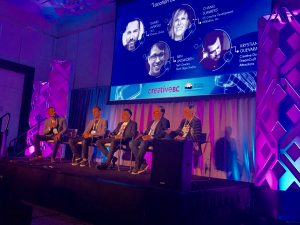
Intel’s Raj Puran, with YDreams’ Daniel Japiassu; VR Studios’ Chanel Summers; Dark Slope Studios’ Ben Unsworth, and DreamCraft Attractions’ Krystian Guevara at the location-based entertainment panel, September 22, 2018
Perhaps the most famous global IP that was on display at the show was from Taiwan’s Studio2 Animation, which debuted its VR series of shorts for the popular animated character Barkley the cat. The 6-minute block of 25 shorts marks a major move into VR for animated content; the Barkely feature film was a huge hit in mainland China and Taiwan in 2016.
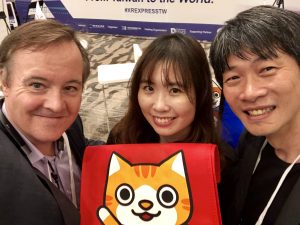
Chris Pfaff, Grace Chuang, and Chiu Li Wei (Studio2 Animation) with Studio2’s Barkley the cat
Producers were quite evident at the show, and highlighted by back-to-back panels on Saturday afternoon, as Chris Pfaff led the ‘Producing in XR: What to Know Before Immersion’ panel, with Silverscreen Cinematics’ Jeff Olm; AWE Company’s Srinivas Krishna, and MediaCombo’s Michael Owen. The panel explored major AR and VR production techniques, as well as post-production considerations. A second panel, ‘Storytelling and Content Creation in VR/AR’ featured Observe Media’s Travis Cloyd; InspireVR’s John Penn; Vuze’s Jim Malcolm, and Cloudhead Games’ Denny Unger.
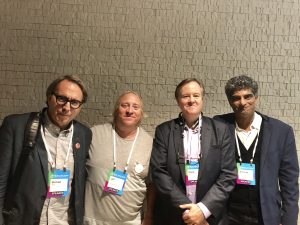
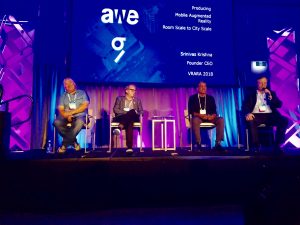
Michael Owen, from MediaCombo; Jeff Olm, from Silverscreen Cinematics; Chris Pfaff, from Chris Pfaff Tech Media, and Srinivas Krishna, from AWE Company, prior to, and on the ‘Producing in XR: What to Know Before Immersion’ panel, September 22, 2018
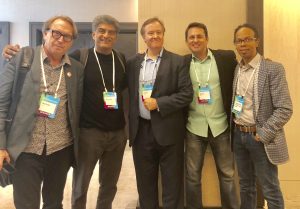
Michael Owen, Srinivas Krishna, Chris Pfaff, Travis Cloyd, and John Penn after their panels, September 22, 2018
Local Vancouver firms were quite visible, from Cognitive3D to Mythical City Games to Stambol Studios. Dark Slope Studios, based in Toronto, held a private event with its principals; the studio is creating location-based immersive entertainment and features an all-star cast of principals, including Raja Khanna, Ben Unsworth, and CJ Hervey.
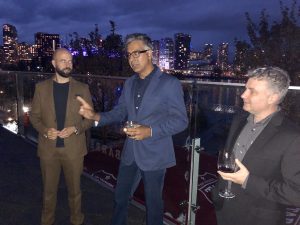
Raja Khanna, center, executive chairman of Dark Slope Studios, welcomes the audience at a private event, Tap & Barrel, Athlete’s Village, Vancouver, September 21, 2018
Of all the myriad experiences being demonstrated on platforms from Vive to Hololens to, yes, Magic Leap, perhaps the most compelling was YDreams’ ‘The Last Squad,’ produced with ArkaveVR. The 3-person VR shooter is an ideal arcade game, and is addictive in its graphical clarity, screen direction, and sheer entertainment value. As a sign of Vancouver’s attractiveness for the XR community, YDreams recently moved its company to the city. The BC Tech group put the final punctuation on the event by holding an after-party at The Cube, the 6,000-square foot co-working space that hosts a wide range of start-ups in the VR/AR space.
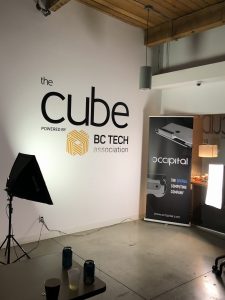
The Cube, scene of the after-party for the VR/AR Global Summit, Vancouver, September 22, 2018
Overall, the VR/AR Global Summit was an affirmation of what the VR/AR Global Association set out to accomplish when Nathan Pettyjohn and a few people started a truly global organization in 2015: bringing the immersive community together on a grand scale. This is still an industry in its early days, and yet even those who have been involved in it for decades see something new every day. So it was in Vancouver; another eye-opener for the immersive crowd.
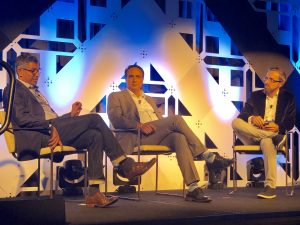
Amar Dhaliwal, Atheer; Parm Sandhu, Telus, and Kris Kolo, executive director of the VR/AR Association
